Suryavansh
Suryavansh or Suryavansha (सूर्यवंश) is one of the types of Kshatriyas. These Kshatriya communities claim descent from Surya. James Tod places it in the list of Thirty Six Royal Races.[1]
One of sons of Brahma was Mārīcha, whose grandson was Vivasvān, from whom started Suryavansha. [2] According to Thakur Deshraj the kshatriyas who followed Solar calender for the calcultion of time were called Suryavanshi.[3][4] Rama was born in Suryavansh.
History
Ram Sarup Joon[5] writes that...When Aryans came to India They called themselves the descendants of Manu and remembered the tragedy of the flood. They came to India in two groups. Their strength cannot be ascertained. One of those advanced straight through the northern plains and founded the town of Ayodhya. The leader of this group was Ikshwaku, who had eight brothers and one sister named Ahalya (or Ela). On arrival at Ayodhya this group clashed with the original inhabitants and drove them down South. The other group settled down on the banks of River Ganga in the area around Haridwar, and stayed there for many generations. The leader of this group was Buddha (not to be confused with Buddha who founded Buddhist Religion). Buddha married Ikshvaku’s sister Ahalya. In his Dynasty were Pandwa etc (not of Mahabharat age/epic). His son was Nahak and his son Yayati, father of Jats.
Historians of the Rajput period have called the Ikshwaku group as Surya Vanshi and the Buddha group as Chandra Vanshi, corresponding to the Sun and Moon. Their origin has been linked with Brahma the creator of the universe. The following genealogical tree was drawn out.
___________________|_____________________
| |
Suryavansh Chandravansh
| |
Marichi Atriya
| |
Kashyap Samudra
| |
Soma
| |
Vaisuta Manu Brahaspati
| |
Man Vantra
| |
Ikshwaku Buddha
The names included in this table, above Ikshwaku and Buddha are just synonyms of the Sun, Moon and Planets.
Suryavanshi Jat Gotras
Asiagh, Bajwa, Bandechhe, Dharatwal, Hundal, Gorya, Junawa, Kachchhawa, Kakran, Kashya, Kashyap, Langar, Maan, Mathur, Narwar, Natt, Nehra, Rathi, Sikarwar, Rana ,
Bhagavata Purana
Bhagavata Purana (Skandha IX Chapter-1) tells us about Suryavansh or Solar race as under:
Sraddhadeva Manu had no child for sometime. Vasistha per formed a sacrifice in honor of Mitra-varuna that he might obtain progeny. Sraddha, wife of the Manu, went to the chief priest and asked for a daughter. So Manu had a daughter named Ila. He took Vasistha to task for having had a daughter. Vasistha thought the priest had done something wrong. He prayed to Bhagavan for the change of Ila's sex. So Ila became a male named Sudyumna and in company with others went on horse back to the chase. He entered a forest called Sukumara, below the Meru, which is the play ground of Siva and his consort. He and his companions were all transformed into females, for such is the mandate of Siva for those that enter the forest. In this changed condition, Sudyumna with his female companions went to Budha. Budha took a fancy for Sudyamna and had by her one son Pururavas.
Vasistha took pity on Sudyumna again and prayed to Siva to change his sex. By the favour of Siva, Sudyumna became a male for one month and a female for another month. He had three sons : Utkala, Gaya and Vimala.
Ikshavaku Brothers
Manu prayed to Vishnu for one hundred years for other sons. He got ten sons like unto himself. Ikshvaku was the eldest.[6]
- Manu
- ↓
- 1.Ikshvaku - 2.Nriga - 3.Saryati - 4.Dishta - 5.Dhrishta - 6.Karusha - 7.Narishyanta - 8.Prishadhra - 9.Nabhaga - 10.Kavi
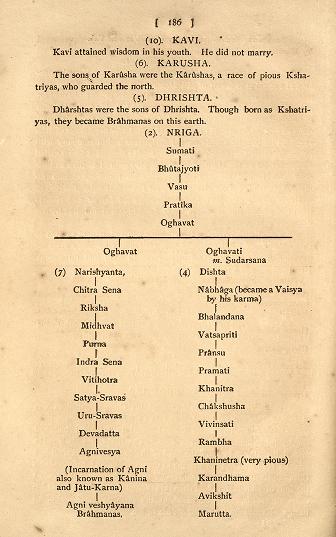
(8). Prishadhra - While residing in the house of his Guru, Prishadhra was placed in charge of cattle. It was raining one night, when a tiger entered the fold. The cattle strayed about in fear and bellowed aloud. Prishadhra ran after the tiger. The night was dark. He missed his aim and cut off the head of the cow, which the tiger had seized. He found out the mistake in the morning and informed his Guru about it. The Guru said : " You shall become a Sudra, as the fruit of your Karma." Prishadhra accepted the curse. He be came an ascetic, and roamed about the earth as the friend of all beings. Eventually He ended his life in fire.
(10). Kavi - Kavi attained wisdom in his youth. He did not marry.
(6). Karusha - The sons of Karusha were the Karushas, a race of pious Kshatriyas, who guarded the north.
(5). Dhrishta - Dharshtas were the sons of Dhrishta. Though born as Kshatriyas, they became Brahmanas on this earth.
(2). Nriga → Sumati → Bhutajyoti → Vasu → Pratika → Oghavat → Oghavat + Oghavati (m.Sudarshana)
(7). Narishyanta → Chitra Sena → Riksha → Midhvat → Purna → Indra Sena → Vitihotra → Satya-Sravas → Uru-Sravas → Devadatta → Agnivesya (Incarnation of Agni also known as Kanina and Jatu-Karna) → Agni veshyayana Brahmanas,
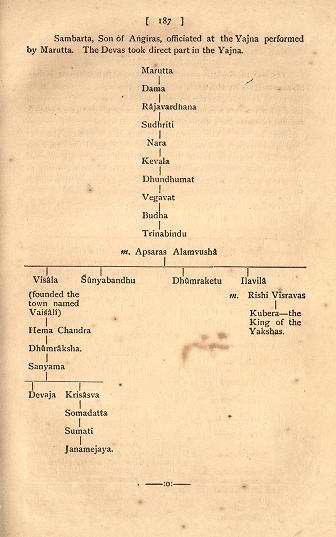
(4). Dishta → Nabhaga (became a Vaisya by his karma) → Bhalandana → Vatsapriti → Pransu → Pramati → Khanitra → Chakshusha → Vivinsati → Rambha → Khaninetra (very pious) → Karandhama → Avikshit → Marutta.
Sambarta, Son of Angiras, officiated at the Yajna performed by Marutta. The Devas took direct part in the Yajna.
Marutta → Dama → Rajavardhana → Sudhriti → Nara → Kevala → Dhundhumat → Vegavat → Budha → Trinabindu
Page 188
(3). Saryati (Skandha IX. Chap. 3)
Saryaji was well versed in the Vedas. He had one daughter, Sukanya. He went with her one day to the Asrama of Chyavana Rishi. Sukanya found there two streaks of light as from glow-worms, issuing from within a mound of earth, thrown up by white ants. She pricked those portions with a thorn and blood oozed out. The party of Saryati found that their usual secretions were stopped. The king thought some one had offended Chyavana. The girl then told her story. The king found the Rishi underneath the mound of earth and asked his pardon. The Rishi wanted the hand of the girl in marriage and Saryati consented. So Sukanya became the wife of Chyavana.
One day the Asvini Kumaras came to Chyavana. The Rishi asked them to give him youth and beauty and promised in return to give them offerings of Soma, though they had no part in Soma Yagas. The Asvini Kumaras took the Rishi inside a tank and all the three came out young and beautiful and looking all alike. Sukanya could not recognise her husband and she prayed to the Asvini Kumaras to remove her confusion. They were pleased with her chastity and pointed out her husband.
One day king Saryati came and found his daughter sitting with a young man. He reproved Sukanya for her supposed unchastity. The girl then related the story of her husband s attaining youth and the king became very much pleased.
Chyavana made offerings of Soma to the Asvini Kumaras. This offended Indra. He held up the Vajra to kill Chyavana, but the son of Bhrigu paralysed the hands of Indra. From that time the Devas consented to give a share in Soma for the Asvini Kumaras.
Saryati → Sukanya (m. Chyavana) + Uttanavarhi + Anarta + Dhuri Sena
Anarta → Revata (He built a town called Kusasthali in the midst of the sea and from that town ruled Anarta and other lands.) → Kakudmin → Revati
Kakudmin took his daughter Revati with him and went to Brahma loka to enquire of Brahma, who should be her husband. The Gandharvas were singing at the time and Kakudmin had to wait for a moment. He then saluted Brahma and made the enquiry. Brahma laughed and said: " O king, the men of your choice are dead and gone. I do not hear even of their sons and grandsons. Twenty seven yuga cycles have now passed away. Therefore go back to thy place and give thy daughter to Baladeva, who has now incarnated as an Ansa (part) of Vishnu for the good of Bhūr-loka. And so the king did. (The Present is the 28th. Yuga cycle. Baladeva is the brother of Sri Krishna.)
(9). Nabhaga - Nabhaga remained long with his Guru. So his brothers thought he had become a Brahma-charin. They reserved no share for him at partition. Nabhaga at last returned to his house and asked for his share in the patrimony. The brothers pointed out their father Manu as his share. Nabhaga asked his father " How is it my brothers have reserved thee for my share?"
Nabhaga → Nabhaga → Ambarisha (+ Ketumat + Sambhu) → Virupa → Prishadasva → Rathitara
Rathitara had no children. At his request Rishi Angiras produced certain sons by his wife. They were known both as Rathitaras and Angirasas.
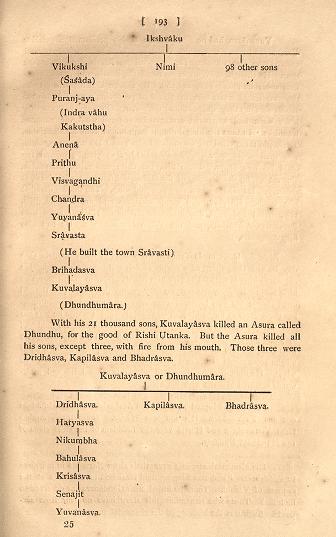
(1). Ikshvaku (Skandha IX. Chaps 6-13) - Ikshvaku was born out of the nostrils of Manu when sneezing. He had one hundred sons. Vikukshi, Nimi, and Dandaka were the eldest born. Twenty five of them ruled on the east of Aryavarta, twenty five on the west and twenty five in the middle. The others ruled else where. For the performance of Ashtaka Sraddha, Ikshvaku once ordered [Vikukshi]] to get some good flesh. Vikukshi had a bagful of good game. But he was hungry and ate one rabbit out of his store.
Vasishtha found fault with this and Ikshvaku had to reject the whole of the game. The King became angry at this and he expelled his son from the kingdom. When Ikshvaku died, Vikukshi returned. He succeeded his father as king and was known as Sasada or Rabbit-eater. Puranjaya was the son of Sasada. He was also called Indravaha and Kakutstha. The Devas had a fight with the Asuras and Indra asked for the help of Puranjaya. Puranjaya wanted Indra to be his carrier, and the King of the Devas became a bull. Puranjaya ascended the bull on its hump. He is therefore called Indra-vaha or Indra-vehicled and Kakutstha or the mounter on the hump. He defeated the Asuras.
Ikshvaku → Vikukshi (Śaśāda)(+Nimi + 98 other sons) → Puranjaya (Indra vahu Kakutstha) → Anena → Prithu → Visvagandhi → Chandra → Yuvanashva → Srāvasta (He built the town Sravasti) → Brihadasva → Kuvalayasva (Dhundhumara)
With his 21 thousand sons, Kuvalayasva killed an Asura called Dhundhu, for the good of Rishi Utanka. But the Asura killed all his sons, except three, with fire from his mouth. Those three were Dridhāsva, Kapilāsva and Bhadrāsva.
Kuvalayasva (or Dhundhumara) → Dridhasva (+ Kapilasva + Bhadrasva) → Haryasva → Nikumbha → Bahulasva → Krisasva → Senajit → Yuvanasva
Page-194
Yuvanashva - Yuvanasva had no son. So the Rishis performed a sacrifice directed to Indra. One night Yuvanasva became very thirsty and entered the Yajna house. He found all the Rishis sleeping at the time. He thought it improper to rouse the Rishis and drank what ever water he found near at hand. By chance that happened to be the consecrated water with the power of producing a son. When the Rishis rose up they did not find the water. On enquiry, when they knew what had happened, every one wondered what the outcome would be. In time the king brought forth a son from his right side. The little thing cried out for milk. Indra said- "Do not weep, child, you shall drink wine ( Mān Dhātā)". So saying he offered the child his fore finger. From this, the child was called Mandhata.
Mandhata
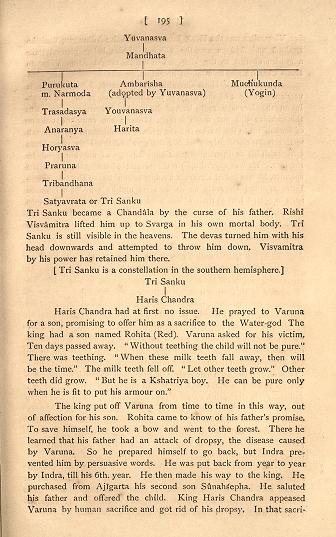
Yuvanasva, by the blessing of the Rishis, did not meet with death at delivery. Mandhata was a very powerful king. The thieves dreaded him much. He performed many sacrifices and made many gifts. He married Indumati, daughter of Sasabindu. He had three sons Purukutsa, Ambarisha, and the Yogin Muchukunda. He had also fifty daughters.
Rishi Soubhari made Tapas in the "waters of the Yamuna. One day he saw the pairing of a couple of fish and became excited. He requested king Mandhata to give him one daughter in marriage. The king said : " By Svayamvara, you may get my daughter " (i. e. the girl must choose her own husband from amongst a number of men offering themselves as husbands.) The Rishi thought because he was old and decrepit therefore the king wanted to put him off. So Soubhari by yogic powers became young and beautiful. All the fifty daughters then accepted him for their husband. The Rishi prepared for himself all the enjoyments of life and passed his days in company with his 50 wives. He then became disgusted with this sensual life and afterwards attained Moksha with his wives.
Yuvanasva adopted his grand son Ambarisha. Ambarisha had one son Youvanasva. His son was Harita. These three, Ambarisha, Youvanasva and Harita were the founders of the chief clans of the Mandhata Dynasty.
The elemental serpents gave their sister Narmodā in marriage to Purukutsa. Purukutsa accompanied Narmoda to Rasatala at the request of Vasuki. There he killed such Gandharvas as deserved to be killed. Those who remember this story have no fear from serpents. Such was the blessing of the elemental serpents.
Yuvanasva → Mandhata → Purukuta (m. Narmoda) (+ Ambarisha + Muchukunda:Yogin) → Trasadasya → Anaranya → Horyasva → Praruna → Tribandhana → Satyavrata or Tri Sanku → Haris Chandra
Mandhata → Ambarisha (adopted by Yuvanasva) → Youvanasva → Harita
Tri Sanku became a Chandala by the curse of his father. Rishi Visvamitra lifted him up to Svarga in his own mortal body. Tri Sanku is still visible in the heavens. The devas turned him with his head downwards and attempted to throw him down. Visvamitra by his power has retained him there. [ Tri Sanku is a constellation in the southern hemisphere.]
Harish Chandra had at first no issue. He prayed to Varuna for a son, promising to offer him as a sacrifice to the Water-god. The king had a son named Rohita (Red). Varuna asked for his victim. Ten days passed away. " Without teething the child will not be pure." There was teething. " When these milk teeth fall away, then will be the time." The milk teeth fell off. "Let other teeth grow." Other teeth did grow. " But he is a Kshatriya boy. He can be pure only when he is fit to put his armour on."
The king put off Varuna from time to time in this way, out of affection for his son. Rohita came to know of his father's promise. To save himself, he took a bow and went to the forest. There he learned that his father had an attack of dropsy, the disease caused by Varuna. So he prepared himself to go back, but Indra prevented him by persuasive words. He was put back from year to year by Indra, till his 6th year. He then made his way to the king. He purchased from Ajigarta his second son Sunahsepha. He saluted his father and offered the child. King Haris Chandra appeased Varuna by human sacrifice and got rid of his dropsy. In that sacrifice,
Page-196
Visvamitra was the Hota, Jamadagni was the Adhvaryu, Vasistha Brahma and Ayasya was the Udgata. Indra being pleased gave a golden chariot to the king. Visvamitra taught Atma Vidya to Haris Chandra and he attained liberation.
[The story of Haris Chandra in this Purana follows the vedic version. The gist of the story is that in the course of further evolution the Devas were to be propitiated by human sacrifice. But this sacrifice did not mean killing. It was the complete offering of oneself up. to the service of the gods. The mission of the human victim is to constantly work for the good of the Universe and to extinguish his own personality. Sunah Śepha was not killed in the sacrifice. He was offered up to the service of the gods. After the sacrifice, he was called Devarata i.e. one offered to the Devas. Visvamitra adopted Devarata as his own son and he asked his hundred sons to accept him as their eldest brother. He disowned those sons that did not obey him (Bhagavata IX- 16). Therefore Visvamitra took the principal part in this sacrifice and not Vasistha, though he was the family preceptor.]
Haris Chandra → Rohita → Harita → Champa (Founder of Champa) → Sudeva → Vijaya → Bharuka → Vrika → Bahuka
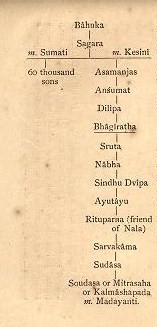
His enemies dispossessed Bahuka of his kingdom. He went to the forest accompanied by his wives. When he died, the eldest queen prepared herself for death also. Rishi Aurva knew her to be big with child, and dissuaded her from accompanying her husband on to the funeral pyre. The co-wives of the queen, out of jealousy, gave her poison. The child was born with this poison, therefore he was called Sagara (Sa = with, gara = poison.) Sagara became a great king. The Seas were dug by his sons. He was prevented by Rishi Aurva from taking the lives of the Talajanghas, Yavanas, Sakas, Haihayas, and Barbars. But he made them change their outward look. He performed an Asvamedha sacrifice as advised by Aurva and Indra stole the sacrificial horse.
Bahuka → Sagara (m.Kesini) → Asamanjas → Ansumat → Dilipa → Bhagiratha → Sruta → Nabha → Sindhu Dvipa → Ayutayu → Rituparna (Friend of Nala) → Sarvakama → Sudas → Soudasa or Mitrasaha or Kalamasapada (m.Madayanti)
Sagara had two wives Sumati and Kesini. The 60 thousand sons of Sumati searched for the horse on all sides. They dug the earth's surface and made the Seas. They found the horse near Kapila. They took him to be the stealer of the horse and abused him. For this they were all burnt up.
Page- 197
Kesini had one son Asamanjas by Sagara. Ansumat was son of Asamanjas. He was attached to his grandfather Sagara. Asamanjas was a Yogin in his former birth. He therefore wanted to avoid company by means of provoking acts. He threw down some children into the Saraju. His father Sagara was thus compelled to forsake him. By Yogic powers, be brought back the children thrown into the Saraju, and left his father for ever.
Ansumat was also sent by Sagara to search for the horse. He found the horse and a heap of ashes near Kapila. He saluted Kapila and glorified him. The Avatara was pleased. He permitted Ansumat to take away the horse. He also informed him that his burnt-up Pitris could only he saved by the water of the Ganga.
Sagara completed the sacrifice with the horse. He made over the kingdom to Ansumat and attained Mukti.
Ansumat made Tapas for the downward flow of Ganga but without success. He was followed by his son Dilipa. He also did not succeed. Bhagiratha was the son of Dilipa. He prayed hard and Ganga appeared in person before him. " Child, I am pleased with thee. What boon do you ask for"? Bhagiratha told her what he prayed for. "But who shall arrest my course, when I fall down. If not arrested I will pierce the earth and reach Rasatala. Again if I pass over earth, men will wash away their sins in my waters. Where shall I wash away those sins, O King ? Therefore do thou ponder well what to do." Said Bhagiratha : " The touch of Sadhus shall take away thy sins. For Vishnu, the destroyer of sins, remains in them. Thy downward course shall be arrested by Rudra." Siva was pleased by the prayer of Bhagiratha, and he consented to hold Ganga.
Ganga came rushing down and she was taken by Bhagiratha to where the ashes of his Pitris lay. The very touch of her waters purified the sons of Sagara and they went to Svarga.
Page -198
Once there lived two Rakshasas. Soudasa killed one and did not kill the other. The surviving Rakshasa, bent on taking revenge, entered the service of Soudasa as a cook. When the king entertained Vasistha, he gave him human flesh to eat. The Rishi became angry and caused Soudasa to become a Rakshasa. When he learned however it was the doing of a Rakshasa, he reduced the king's Rakshasa life to 12 years. The king also held out water for the execration of Vasistha. His queen prevented him. So he threw the water at his own feet. His feet became black with sin. While living as a Rakshasa, the king saw a Brahmana and his wife in their privacy, and he attacked the Brahmana. The wife reminded the king of his former birth and requested him not to deprive her of her husband at the time of enjoyment. The king heeded not her words but devoured the Brahmana. The Brahmana woman cursed Soudasa so that he should meet with death whenever he had female connection. On the expiry of 12 years, Soudasa reverted to his former birth, but for fear of the curse he had no connection with women. Vasistha at the request of Soudasa produced a son by his wife, Madayanti. The conception lingered for 7 years. Vasistha struck the womb with a stone (Asman) and the son was hence called Asmaka. The son of Ashmaka was Balika. He was the surviving Kshatriya, after the extirpation of that caste by Parasurama. Hence he was called Mulaka also (the root of a race).
Soudasa → Ashmaka → Balika or Mulaka → Dasharatha → Aidavidi → Visvasaha → Khatvanga
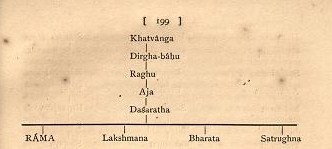
Khatvanga (खट्वांग) was a very powerful king. He killed Daityas as a friend of the Devas. The Devas offered him a boon. The king wanted to know how much longer he was to live. Learning it was a Muhurta only, he returned forthwith to his place and concentrated his mind on Bhagavan. He attained Mukti.
Dasharatha Ancestry
Page-199
Khatvanga → Dirgha-bahu → Raghu → Aja → Dasharatha → Rama + Lakshmana + Bharata + Satrughna

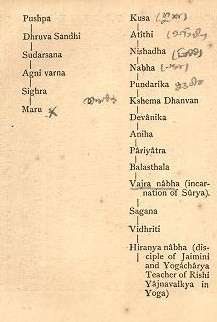
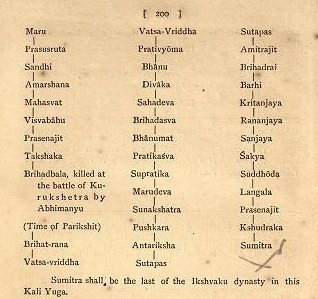
The story of Rama as told in the Ramayana is widely and universally known. It is therefore unnecessary to repeat that story from the Bhagavata Purana.
Lakshmana → Angada + Chitraketu
Satrughna → Subahu + Sruta sena.
Kusha → Atithi → Nishadha → Nabha → Pundarika → Kshema Dhanvan → Devanika → Aniha → Pariyatra → Balasthala → Vajra Nabha (Incarnation of Surya) → Sagana → Vidhriti → Hiranya Nabha → Pushpa → Dhruva Sandhi → Sudarshana → Agni Varna → Maru → Prasusruta → Sandhi → Amarshana → Mahasvat → Visvabahu → Prasenajit → Takshaka → Brihadbala (killed at the battle of Kurukshetra by Abhimanyu)
(Time of Parikshit)
Brihat-rana → Vatsa-vriddha → Prativyoma → Bhanu → Divaka → Sahadeva → Brihadasva → Bhanumat → Pratikasva → Supratika → Marudeva → Sunakshatra → Pushkara → Antariksha → Sutapas → Amitrajit → Brihadrai → Barhi → Kritanjaya → Rananjaya → Sanjaya → Shakya → Suddhoda → Langala → Prasenajit → Kshudraka → Sumitra
Sumitra shall be shall be the last of Ikshvaku dynasty in this Kaliyuga.
Nimi Ancestry
The Rishis churned the body of Nimi and a son was born. He was called Janaka. As he was born, when his father was bodiless (videha) he was also called Vaideha.
Page- 201
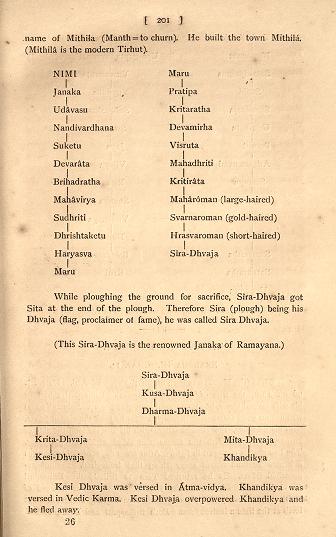
The churning also gave him the name of Mithila (Manth = to churn). He built the town Mithila. (Mithila is the modern Tirhut).
Nimi → Janaka → Udavasu → Nandivardhana → Suketu → Devarata → Brihadratha → Mahavirya → Sudhriti → Dhrishtaketu → Haryasva → Maru → Pratipa → Kritaratha → Devamirha → Visruta → Mahadhriti → Kritirata → Maharoman (large-haired) → Svarnaroman (gold-haired) → Hrasvaroman (short-haired)]] → Sira-Dhvaja
While ploughing the ground for sacrifice, Sira-Dhvaja got Sita at the end of the plough. Therefore Sira (plough) being his Dhvaja (flag, proclaimer of fame), he was called Sira Dhvaja. (This Sira-Dhvaja is the renowned Janaka of Ramayana.)
In the ancestry of Sira-Dhvaja were Sira-Dhvaja → Kusa-Dhvaja → Dharma-Dhvaja → Krita-Dhvaja + Mita-Dhvaja
Kesi-Dhvaja from Krita-Dhvaja was versed in Atma-vidya and Khandikya from Mita-Dhvaja was versed in Vedic Karma. Kesi Dhvaja overpowered Khandikya and he fled away.
Page 202
Kesi-Dhvaja → Bhanumat → Sata-dyumna → Suchi → Sanadvaja → Urja-ketu → Purujit → Arishta nemi → Srutayu → Suparsva → Chitraratha → Kshemadhi → Samaratha → Satyaratha → Upa-guru → Upa-gupta (incarnation of Agni)]] → Vasvananta → Yuyudha → Subhashana → Sruta → Jaya → Vijaya → Rita → Sunaka → Vitahavya → Dhriti → Bahulasva → Kriti
These kings of Mithila were well versed in Atma-vidya.
The great Suryavanshi kings
Kashyapa (1) (कश्यप) was an ancient sage (rishis). He is the son of Marichi, one of the ten sons (Maanasa-putras) of the Creator Brahma. The Prajapati Daksha gave his thirteen daughters (Aditi, Diti, Kadru, Danu, Arishta, Surasa, Surabhi, Vinata, Tamra, Krodhavasa, Ida, Khasa and Muni in marriage to Kashyapa.
- His sons from Aditi or Adityas (Sons of Aditi) were, Aṃśa, Aryaman, Bhaga, Dhūti, Mitra, Pūṣan, Śakra, Savitṛ, Tvaṣṭṛ, Varuṇa, Viṣṇu, and Vivasvat or Vivasvan , who went on to start the Solar Dynasty (Suryavansha), which later came to be known as Ikshvaku dynasty, after his great grandson, King Ikshvaku, whose subsequent kings were, Kukshi, Vikukshi, Bana, Anaranya, Prithu, Trishanku, and finally King Raghu, who gave it the name, Raghuvansha (Dynasty of Raghu), and then further leading up to Lord Rama, the son of Dashratha [7].
- His sons from Diti were, Hiranyakashipu and Hiranyaksha and a daughter Sinhika, who later became the wife of Viprachitti. Hiranyakashipu had four sons, Anuhlada, Hlada, Prahlada, and Sanhlada, who further extended the Daityas .
- Garuda and Aroona are the sons of Kashyapa from his wife, Vinata [8]
- The Nāgas (serpents) are his sons from Kadru.
- The Danavas are his sons from Danu.
- The Bhagavata Purana states that the Apsaras were born from Kashyap and Muni.
Nriga (2.2)(नृग) Nriga was son of Ushinara. Samrat Yayati's fourth son was Anu. Anu's eighth son was Maharaja Mahamana. Ushinara was son of Mahamana and he was ruler over most of Punjab. Ushinara's son was Nriga and Nriga's son was Yaudheya. The Yaudheya clan has originated from him. Johiya is derived from Yaudheya. Raja Nriga has been mentioned in Mahabharata Bhisma Parva. Nriga is gotra of Jats. This gotra originated from Raja Nriga (नृग).
Karusha (2.2)(करुष) -
Narishyanta (2.7) (नरिष्यन्त), in Hindu mythology, was son of Vaivasvata Manu and belongs to solar race of Kshatriyas. Nehra Jats are said to be descended from him.
From 'Kakustha' started a Jat vansha known as 'Kusth' or Kakvansh. This later changed due to language variations to 'Kakustha', Kāk, Kāktīya, Kakka, Kuk, Kukkur, Kak and Kākarāṇ. In this very clan was born Dashratha's grandfather Raghu who started Raghuvansh. Raghuvanshi Jats are also descendants of him who are also known as 'Raghuvanshi Sikarwar’. During Ramayana period, in Balmiki Ramayana, Deva Samhita, Vishnu Puran, Shiv Puran, Vedas etc there is mention of Jats and their republics at various places. Jatvansha joined his army of Vashishtha Rishi in his support and fought war with Vishvamitra. This was a very severe war in which thousands of Jat soldiers were killed. [7]
Bhaleram Beniwal has provided evidences from ‘Bala Kanda (ekonavish sarga shloka-16, dvavish sarga shloka-6’, dvavish sarga shloka-20, panchvish sarga shloka-15, pratham sarga shloka-56) to prove that Dashratha and his son Rama were ‘kakustha’ and Raghuvanshi Jats. Rama has been addressed by the names Raghunandan, Raghukul, Kakasthkul, and Raghuvanshi. Later Lava, elder son of Rama started Lamba gotra in Jats and Kusha started Kachhavahi or kushavansha whose descendant Brahdala was killed by Abhimanyu, son of Arjuna. Suryavanshi kushavansha Jats ruled Ayodhya from 3100 BC to 500 BC. In the 21st generation of Ikshvaku was born Mandhata who has been written and proved as Gaurvanshi Jat in genealogy of Suryavanshi kings. [8] One of sons of Mandhata was Ambarish. His son was Yuvanashva and his son was Harit, who was a great Rishi. The descendants of this king became Brahman who were known as Gaur Brahmans. [9]
Kuvalayashva (कुवलयाश्व) (14) - Originator of Koid Jat Gotra.
Mandhata (23) (मान्धाता) - Also called Shivapuri or Omkareshwar, is an island in the Narmada river in Khandwa district in Madhya Pradesh. Situated on on the south bank of the Narmada, it contains one of the twelve great lingas of Shiva. Omkareshwar Mandhata is located on the Mandhata hill on the banks of the Narmada. The name "Omkareshwar" is due to the shape of the island. River Narmada and its branch river Kaveri form an island. This Island is shaped like the Om and is about 2km long and 1km wide. Local tradition reveals that King Mandhata paid homage to Shiva here and made this holy place his capital. Mandhata is also known by the name Amareshwara. Skandapurana Rewakhanda (28,133) has mentioned about this place. This place is situated at a distance of about 10 km from Omkareshwar railway station on Ajmer-Khandwa track.
The most prominent among the sons of Mandhata was he who is celebrated as Ambarisha. Ambarisha was accepted as son by his grandfather Yuvanasva. Ambarisha's son was Yauvanasva, and Yauvanasva's son was Harita. In Mandhata's dynasty, Ambarisha, Harita and Yauvanasva were very prominent.
Bharuka (भारूक) (42) -
Vrika (वृक)(43) -
Bahuka (बाहुक)(45) -
Bharata (भरत) (46) -
Asita (असित)(42) -
Sagar (48) - Sagar is one of the greatest kings of Suryavansh in the Satya Yuga. He is ancestor to King Dasharatha and Lord Rama. King Sagar performed a horse sacrifice (Ashwamedha yajna) to prove his supremacy. Lord Indra, the leader of the demigods, became fearful over the results of the yajna, so he decided to steal the horse. He left the horse at the ashram of Kapila, who was in deep meditation. King Sagar’s 60,000 sons (born of Queen Sumati) and his son Asamanjas (born of Queen Keshini) were then sent to find the horse. When the 60,000 sons found the horse at Kapiladeva’s ashram, they thought he had stolen it. When they prepared to attack the meditating rishi (sage), Kapiladeva opened his eyes. Because the sons of King Sagara had disrespected such a great personality, consequently, fire emanated from their own bodies, and they were immediately burned to ashes.
Later King Sagar sent his grandson Anshuman to retrieve the horse. Kapiladeva returned the horse and told Amsuman that the sons of King Sagar could be delivered if the Ganges descended to earth and bathed them in her waters. King Sagar’s great-great-grandson, Bhagiratha, eventually pleased Mother Ganga, and asked her to come to earth. Mother Ganga told Bhagiratha that the force of the Ganges falling from heaven would be too great for the earth to sustain, and that she needed someone to break the fall. Bhagiratha then worshiped Lord Shiva, who then agreed to accept the descending river upon his head.
King Bhagiratha then preceded the holy river with his chariot and ripped open a gorge in which the Ganga (Ganges) could flow. The river followed the King to Ganga Sagar at the Bay of Bengal, where Kapiladeva resides. The Ganga River then bathed the remains of the 60,000 sons and returned them to their eternal positions.
Dilipa (51)' (दिलीप) was son of Anshumata and father of Bhāgīratha. He was a great king. His son Bhagiratha brought the River Ganga on earth.
Bhagiratha (भागीरथ)(52) - He was a descendent of the great king Sagara of the Suryavansh. He was one of the forefathers of Lord Rama. He was a great king in Hindu mythology who brought the River Ganga to Earth. He was one of the forefathers of Lord Rama. He lost his father when he was just a child, and was raised by his mother. For its descent to Earth being owed to Bhagiratha's efforts, Ganga is also known as Bhagirathi (daughter of Bhagiratha) as proclaimed by Lord Brahma. Bhagiratha's own great effort was praised by all the Gods and his ancestors, and is known as a Bhagiratha Prayatna, as proclaimed by Lord Brahma. It is a great inspiration to any man who seeks to do something noble despite facing overwhelming odds.
Kakutsa (काकुत्स) (54) -
Nabha (नाभ) (56) -
Nala (नल) - Nala was a Suryavanshi Kachhawah Jat whose capital was Narwar.
Ashmaka (अश्मक) (65) -
Dasharatha (दशरथ)(77) -
Takshaka (तक्षक)(111) - Takshaka was one of the Nagas mentioned in the epic Mahābhārata. He lived in a city named Takshasila, which was the new territory of Takshaka after his race was banished by Pandavas headed by Arjuna from the Khandava Forest and Kurukshetra, where they built their new kingdom.
Langala (लांगल) -
Genealogy of Ikshvaku (Suryavansha)
Following Genealogy of Ikshvaku (Suryavansha) is from book Bhaleram Beniwal:Jat Yauddhaon Ka Itihas, pp.133-137
-
Genealogy of Suryavansha-1 (Vishnu - Brihadashva), Bhaleram Beniwal, p.133
-
Genealogy of Suryavansha-2 (Kuvalayashva - Bharuka), Bhaleram Beniwal, p.134
-
Genealogy of Suryavansha-3 (Vrika - Aja), Bhaleram Beniwal, p.135
-
Genealogy of Suryavansha-4 (Dasharatha - Brihadbala), Bhaleram Beniwal, p.136
-
Genealogy of Suryavansha-5 (Brihadrana - Sumitra), Bhaleram Beniwal, p.137
See also
References
- ↑ James Todd, Annals and Antiquities of Rajasthan, Volume I,: Chapter 7 Catalogue of the Thirty Six Royal Races, p. 99
- ↑ Bhaleram Beniwal: Jāton kā Ādikālīn Itihāsa, Jaypal Agencies, Agra 2005 (Page 25)
- ↑ Thakur Deshraj: Jat Itihasa (Hindi), Maharaja Suraj Mal Smarak Shiksha Sansthan, Delhi, 1934, 2nd edition 1992 (Page 138)
- ↑ CV Vaidya, History of Medieval Hindu India
- ↑ History of the Jats/Chapter II,p. 20
- ↑ Skandha IX Chapter-2
- ↑ Bhaleram Beniwal: Jāt Yodhaon ke Balidān, Jaypal Agencies, Agra 2005 (Page 38)
- ↑ Vishnu Puran part IV Chapter 2-3
- ↑ Bhaleram Beniwal: Jāt Yodhaon ke Balidān, Jaypal Agencies, Agra 2005 (Page 39-40)






